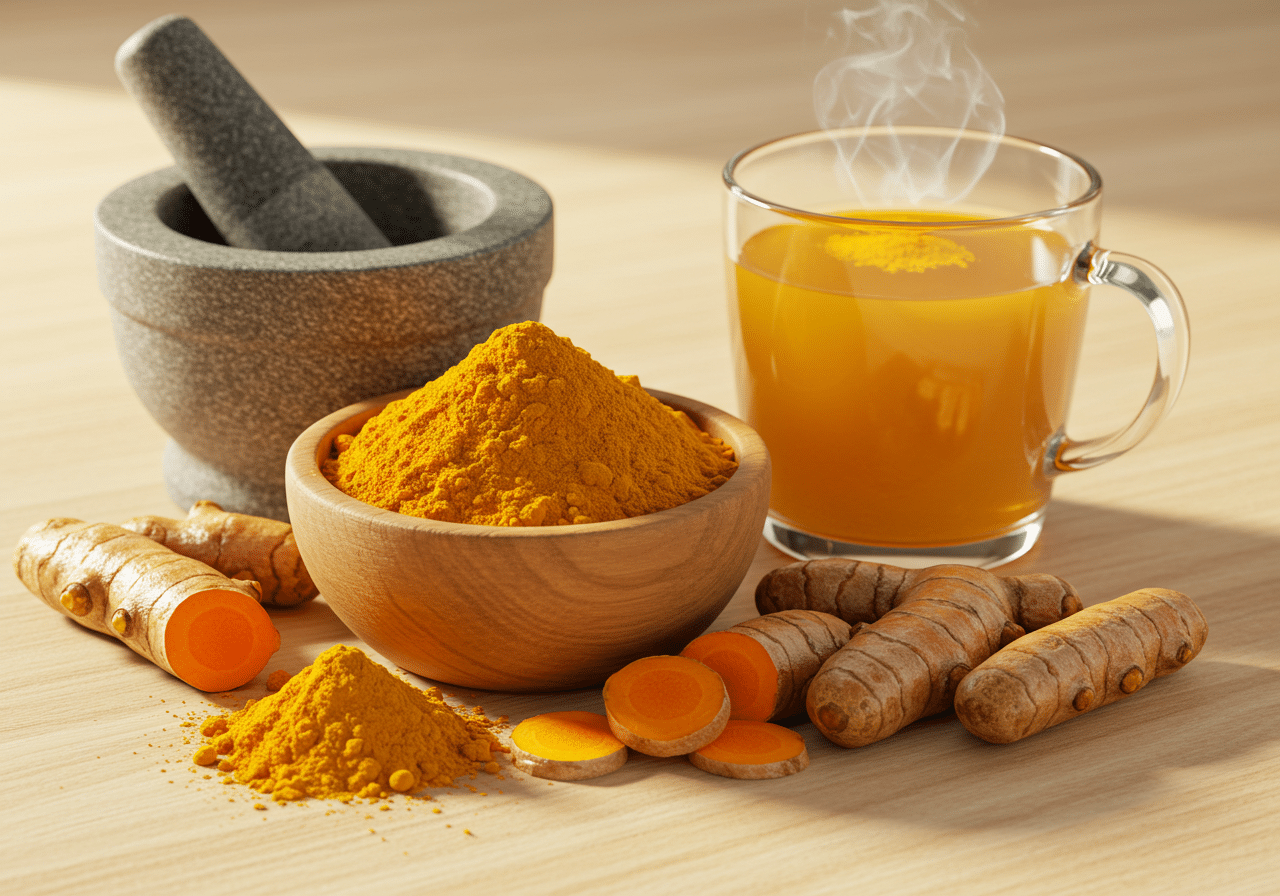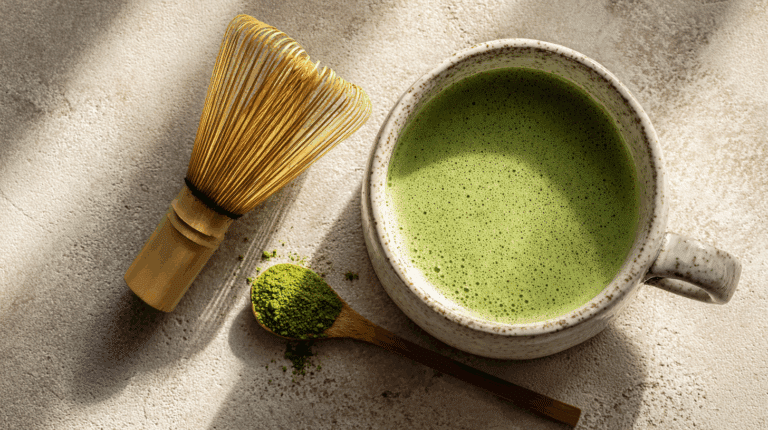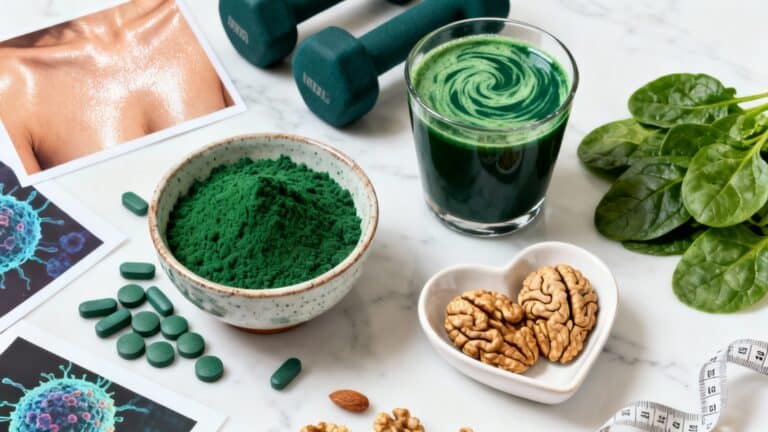Top 15 Turmeric Benefits for Inflammation, Immunity, and Overall Health

You’ve likely heard turmeric praised as a superfood, but you might not realize just how extensively this golden spice can transform your health. From dramatically reducing inflammation at the cellular level to strengthening your immune defenses against infections, turmeric’s active compound curcumin operates through multiple biological pathways simultaneously. What’s particularly fascinating is how this single ingredient addresses everything from joint pain to heart disease—and the mechanisms behind these benefits reveal why turmeric deserves serious consideration in your wellness routine.
Reduces Chronic Inflammation Through NF-kB Inhibition
When chronic inflammation persists in your body, it activates a key protein called NF-κB that triggers widespread tissue damage and disease.
Curcumin, turmeric’s active compound, directly targets this inflammatory pathway by binding to upstream signaling kinases like IKKβ. This binding prevents NF-κB from moving into your cell’s nucleus, where it would normally trigger inflammatory gene expression.
The turmeric benefits extend beyond basic inflammation control. Curcumin blocks cytokine-mediated activation in your intestinal cells and reduces inflammatory markers like ICAM-1 and IL-8. This protective mechanism works by preventing IκBα degradation, which normally allows inflammatory proteins to reach the nucleus and activate harmful genes.
You’ll find that benefits of turmeric tea can provide these protective effects through regular consumption. The curcumin benefits include preventing tissue damage while maintaining pathway specificity—it won’t interfere with your body’s essential wound-healing processes, making it a targeted anti-inflammatory solution.
Provides Powerful Antioxidant Protection Against Free Radicals
As reactive oxygen species bombard your cells throughout the day, curcumin acts as a molecular shield by directly neutralizing these harmful compounds before they can damage cellular structures. Turmeric benefits include donating hydrogen atoms to quench free radicals while its β-diketone structure enhances antioxidant capacity. You’ll experience enhanced protection as curcumin targets singlet oxygen and prevents oxidative chain reactions in your cell membranes. Additionally, engaging in mindful meditation can further amplify your body’s resilience against oxidative stress and improve overall mental wellness.
Curcumin benefits extend to boosting your body’s natural defenses by increasing antioxidant enzyme levels like superoxide dismutase and catalase. These enzymes provide long-term cellular protection, particularly for your liver and brain.
Research shows that turmeric contains approximately 235 compounds including powerful phenolics and terpenoids that work synergistically to enhance antioxidant effectiveness. Turmeric tea benefits include protecting your DNA and proteins from oxidative damage while supporting mitochondrial health. This all-encompassing antioxidant action helps preserve your cellular integrity against daily oxidative stress.
Supports Immune System Function and Antimicrobial Defense
Your immune system gets a significant boost from turmeric’s powerful compounds, which actively fight off bacterial infections while fine-tuning your body’s natural defense mechanisms. You’ll find that curcumin doesn’t just enhance your ability to ward off pathogens—it also helps regulate immune responses to prevent them from becoming overactive or misdirected. This dual action means you’re getting protection against harmful invaders while reducing the inflammatory damage that can occur when your immune system turns against your own tissues.
The phytonutrients in turmeric work to neutralize free radicals that can compromise your cellular health and weaken immune function. Additionally, turmeric can be complemented by Echinacea, which may lessen symptoms if taken as others become sick.
Fights Bacterial Infections
Beyond its well-known anti-inflammatory properties, turmeric demonstrates powerful antibacterial effects that can strengthen your body’s natural defense against harmful microorganisms.
Research shows turmeric’s ethanolic extract creates inhibition zones of 4-10mm against various bacterial strains, with particularly strong effects against Staphylococcus aureus and Bacillus cereus at concentrations as low as 0.25 mg/mL.
Curcumin benefits include broad-spectrum antimicrobial action against both Gram-positive and Gram-negative bacteria at relatively low concentrations. Additionally, incorporating immune-boosting foods like garlic and citrus fruits can further enhance your body’s defenses.
Turmeric supplement benefits extend to fighting multiple drug-resistant bacterial strains, offering promise against antibiotic resistance.
The compound disrupts bacterial cell walls while reducing oxidative stress that weakens immune function. Studies demonstrate that curcumin effectively inhibits the growth of dangerous pathogens including Salmonella and E. coli, making it particularly valuable for maintaining digestive health.
These turmeric benefits make it a valuable natural alternative for preventing bacterial infections and supporting your immune system’s ability to combat pathogens effectively.
Modulates Immune Responses
While turmeric’s antibacterial properties provide direct pathogen defense, its most advanced health benefit lies in modulating your immune system‘s complex cellular responses.
Curcumin benefits include enhancing CD8+ cytotoxic T cells while reducing immune-suppressive regulatory T cells, strengthening your body’s ability to fight infections and tumors.
You’ll experience improved natural killer cell activity and enhanced dendritic cell function, which better presents antigens to activate adaptive immunity.
Turmeric benefits extend to cytokine regulation, where curcumin suppresses inflammatory mediators like TNF-α and IL-6 while promoting anti-inflammatory responses.
The benefit of turmeric includes stimulating phagocytic activity in macrophages and modulating immune cell polarization. These effects occur through regulation of NF-κB pathways, which control the production of pro-inflammatory cytokines.
This thorough immune modulation helps balance your system’s activation and tolerance, maintaining ideal immune homeostasis for enhanced pathogen clearance.
Reduces Autoimmune Inflammation
Curcumin’s immune-modulating capabilities shine brightest when your body’s defense system turns against itself in autoimmune conditions. You’ll find significant relief from rheumatoid arthritis and multiple sclerosis symptoms as curcumin blocks inflammatory pathways like mTOR. This powerful compound reduces joint inflammation and redness while increasing adiponectin, an anti-inflammatory cytokine that further combats autoimmune responses. Additionally, ginger’s antimicrobial properties complement curcumin’s effects by providing further support against infections that can exacerbate autoimmune conditions.
The turmeric benefits extend beyond symptom management – you’re getting a safer alternative to NSAIDs with fewer side effects. Research shows curcumin treatment significantly increases clinical remission rates in ulcerative colitis patients, demonstrating its therapeutic potential for inflammatory bowel conditions. Tumeric supplements benefits include restoring balance between harmful Th17 cells and protective T cells, while turmeric juice benefits provide antimicrobial defense against infections.
You’ll experience enhanced immune regulation through altered enzyme activities and transcription factors, making curcumin an effective therapeutic option for managing autoimmune diseases naturally.
Alleviates Joint Pain and Arthritis Symptoms
When joint pain disrupts your daily activities, turmeric offers a natural solution that’s backed by scientific research. Curcumin, turmeric’s active compound, delivers anti-inflammatory effects comparable to NSAIDs for knee osteoarthritis pain relief.
Studies show that consuming about 1000 mg daily of curcumin reduces joint swelling, morning stiffness, and pain scores in both osteoarthritis and rheumatoid arthritis patients. Research demonstrates that curcumin users experience fewer side effects compared to traditional anti-inflammatory medications, with significantly reduced stomach-related issues.
The benefits of turmeric extend beyond joint comfort—it improves overall joint function while maintaining a favorable safety profile. You can incorporate this powerful spice into your routine through cooking or supplements.
While turmeric benefits for skin and turmeric tea benefits health are well-documented, its joint-supporting properties make it an excellent complementary therapy alongside traditional treatments for managing arthritis symptoms naturally.
Promotes Heart Health and Cardiovascular Function
Beyond supporting joint comfort, turmeric delivers powerful cardiovascular benefits that protect your heart through multiple protective mechanisms.
Turmeric curcumin vitamin benefits include potent antioxidant properties that neutralize free radicals and reduce chronic inflammation—key factors in heart disease development. You’ll experience improved lipid profiles as curcumin lowers LDL cholesterol and triglycerides while potentially raising beneficial HDL cholesterol.
What is turmeric good for extends to preventing arterial plaque buildup and endothelial dysfunction, reducing your risk of heart attacks and strokes. A 2012 study demonstrated that patients taking 4 grams of curcumin around surgery experienced a 65% decreased risk of heart attack.
Research shows turmeric consumption links to decreased cardiovascular mortality rates. For those with hypertensive heart disease, curcumin prevents pathological cardiac remodeling and reduces heart strain biomarkers.
While turmeric for flat tummy remains popular, these cardiovascular benefits make turmeric essential for long-term heart health protection.
Enhances Brain Health and Cognitive Performance
Your brain’s chemical messengers get a significant boost when you incorporate turmeric into your routine, as curcumin enhances neurotransmitter production vital for mental clarity and mood regulation.
You’ll also experience protection against age-related mental decline, since this powerful compound actively prevents cognitive deterioration over time. Research demonstrates that 90 mg twice daily can lead to enhanced selective reminding, visual memory, and attention improvements over an 18-month period.
These neurological benefits make turmeric an essential addition to your daily wellness regimen for maintaining sharp mental function as you age.
Boosts Neurotransmitter Production
Though your brain produces neurotransmitters naturally, curcumin can greatly boost the production of two key chemicals that directly impact your mental well-being: serotonin and dopamine. These neurotransmitters regulate your mood, cognitive function, and appetite while reducing depression symptoms. Research shows that curcumin also inhibits MAO-A, the enzyme that breaks down these crucial mood-regulating chemicals, allowing them to remain active longer in your brain.
When you’re exploring how to take tumeric for maximum brain benefits, you’ll discover that curcumin’s anti-inflammatory properties directly enhance neurotransmitter synthesis. This mechanism creates a powerful neurochemical balance that improves your overall mental health.
Tumeric pill benefits extend beyond basic spices benefits because concentrated curcumin delivers therapeutic doses that your brain needs. By increasing serotonin and dopamine levels, you’re actively supporting your brain’s natural ability to maintain positive mood states, sharper focus, and better emotional regulation—effects that standard dietary intake rarely achieves.
Prevents Cognitive Decline
As cognitive decline threatens millions of aging adults worldwide, curcumin emerges as a powerful ally in preserving your brain’s most essential functions.
Studies show you’ll experience a remarkable 28% improvement in memory tests after 18 months of curcumin supplementation. The compound actively prevents amyloid plaque formation and tau protein accumulation—key drivers of Alzheimer’s disease.
You’ll notice enhanced verbal memory, visual memory, and attention when consuming bioenhanced forms like Theracurmin. Curcumin’s antioxidant properties protect your neurons from oxidative damage while reducing chronic inflammation that accelerates neurodegeneration. UCLA researchers discovered that curcumin reduces amyloid and tau protein levels in critical brain regions including the amygdala and hypothalamus.
Regular consumption through turmeric tea benefits of improved mood and cognitive resilience, while turmeric meals provide sustained neuroprotection. Asian populations consuming curry regularly demonstrate superior cognitive test scores, highlighting turmeric’s real-world protective effects against dementia.
May Help Prevent and Support Cancer Treatment
While cancer remains one of the most challenging health conditions worldwide, emerging research suggests turmeric’s active compound curcumin may offer powerful support in both prevention and treatment.
Laboratory studies demonstrate curcumin’s ability to inhibit tumor initiation, promotion, and progression across various cancer models. You’ll benefit from its multi-targeted approach, which modulates gene expression in cancer pathways and induces cell death in certain cancer cells.
Clinical trials show promise when you combine curcumin with standard treatments. Phase 2 studies found it safe and tolerable with chemotherapy for colorectal cancer, potentially improving survival rates.
Curcumin may enhance your cancer cells’ sensitivity to conventional therapies while helping overcome drug resistance. Its anti-inflammatory properties create less favorable environments for cancer development, targeting proteins involved in metastasis. The compound’s antioxidant properties help neutralize harmful free radicals that can contribute to cellular damage and cancer progression.
Boosts Natural Antioxidant Enzyme Production
Beyond directly neutralizing harmful free radicals, curcumin activates your body’s own antioxidant defense system by stimulating the production of essential protective enzymes.
This occurs through curcumin’s modulation of the Nrf2 signaling pathway, where it inhibits Keap1 protein and promotes antioxidant gene transcription.
You’ll experience enhanced activity of vital enzymes like superoxide dismutase (SOD) and peroxidase (POD), which defend against oxygen-free radicals.
Curcumin also upregulates specialized enzymes including NQO1, HO-1, and GST, creating a thorough cellular protection network.
This enzymatic boost helps clear free radicals more efficiently, strengthening your cellular antioxidant activity. The effectiveness of these protective mechanisms depends on concentration levels, as curcumin’s dual nature means it can function differently under various dosing conditions.
Improves Mood and Mental Well-being
When you’re struggling with mood challenges or mental health concerns, curcumin offers powerful support through its direct influence on your brain’s neurotransmitter systems.
This active compound in turmeric modulates serotonin and dopamine levels, helping stabilize your mood naturally. Curcumin’s anti-inflammatory properties reduce neuroinflammation linked to depression and anxiety, while its neuroprotective effects safeguard brain cells from oxidative damage that contributes to mood disorders.
Clinical studies demonstrate curcumin’s effectiveness in reducing depression symptoms, with participants showing mild to moderate mood improvements. Effects may require at least four weeks to become noticeable when taken consistently at proper doses.
By influencing stress-response pathways in your brain, curcumin enhances emotional resilience and reduces stress sensitivity.
- Modulates key neurotransmitters like serotonin and dopamine for mood regulation
- Reduces neuroinflammation that exacerbates depression and anxiety symptoms
- Protects brain cells from oxidative stress and mitochondrial damage
- Enhances stress response and emotional coping abilities
Reduces Oxidative Stress Throughout the Body
Your body constantly battles harmful free radicals that damage cells and accelerate aging, but turmeric’s powerful compounds fight back by neutralizing these destructive molecules.
You’ll also benefit from turmeric’s ability to boost your natural antioxidant enzymes like catalase and glutathione peroxidase, creating a stronger internal defense system.
This dual protection helps shield your cellular DNA from oxidative damage that can lead to serious health problems over time. Curcumin demonstrates this remarkable dual role by functioning as both an antioxidant that protects healthy cells and a pro-oxidant that generates reactive oxygen species to target harmful tumor cells.
Neutralizes Harmful Free Radicals
One of turmeric’s most powerful health benefits lies in its ability to neutralize harmful free radicals and reduce oxidative stress throughout your body.
Turmeric’s phenolic compounds act as potent electron donors, rapidly neutralizing superoxide radicals, hydrogen peroxide, and other reactive oxygen species before they can damage your cells. This broad-spectrum antioxidant activity works across multiple cellular compartments, including your mitochondria and cytoplasm, protecting your DNA and proteins from oxidative damage.
- Blocks lipid peroxidation chains that compromise cell membrane integrity and cellular function
- Reduces malondialdehyde levels considerably, a key marker indicating decreased oxidative damage
- Modulates radical-producing enzymes like lipoxygenase and xanthine oxidase to limit excessive ROS production
- Protects multiple organ systems including kidneys and liver from toxin-induced oxidative injury
Boosts Natural Antioxidant Enzymes
Beyond neutralizing free radicals directly, turmeric takes your body’s antioxidant defense to the next level by boosting production of your natural antioxidant enzymes.
Curcumin activates the Keap1-Nrf2/ARE pathway, triggering enhanced expression of critical enzymes like SOD, catalase, and glutathione peroxidase. These enzymes work systematically—SOD converts dangerous superoxide radicals into safer molecules, catalase breaks down hydrogen peroxide, and glutathione peroxidase strengthens cellular defenses against oxidative damage.
This enzymatic boost considerably reduces oxidative stress biomarkers like MDA while preserving mitochondrial function and membrane integrity.
Your enhanced antioxidant networks provide stronger protection against neurodegenerative diseases, metabolic disorders, and cardiovascular damage.
However, you’ll achieve ideal results with low to moderate doses, as excessive amounts may paradoxically increase oxidative markers.
Protects Cellular DNA Damage
Turmeric’s protective effects reach the most fundamental level of your health—your cellular DNA. Curcumin’s powerful antioxidant properties directly scavenge free radicals while enhancing your body’s DNA repair mechanisms. This dual action maintains genome integrity by preventing oxidative damage that can lead to serious health complications.
Your mitochondrial DNA receives special protection as curcumin reduces ROS production and prevents the formation of 8-hydroxy-20-deoxyguanosine, a key marker of DNA damage. These effects create a protective cellular environment that supports long-term health.
- Enhances DNA repair enzymes involved in base excision repair and nonhomologous end-joining pathways
- Repairs double-strand breaks vital for maintaining chromosome stability
- Protects mitochondrial DNA from oxidative damage and dysfunction
- Prevents DNA damage markers in populations exposed to environmental toxins
Supports Healthy Blood Vessel Function
While many supplements claim cardiovascular benefits, curcumin delivers measurable improvements to your blood vessel function through multiple proven mechanisms.
In clinical studies, 12 weeks of curcumin supplementation increased resistance artery endothelial function by 37% and improved large artery health by 36% through enhanced flow-mediated dilation.
Curcumin boosts nitric oxide bioavailability, promoting blood vessel dilation and reducing vascular resistance.
This improved circulation decreases strain on your cardiovascular system while supporting healthy blood pressure. The compound’s antioxidant properties protect endothelial cells from oxidative damage, while its anti-inflammatory effects preserve vessel integrity.
Additionally, curcumin stimulates vascular endothelial growth factor production, encouraging new blood vessel formation and supporting tissue repair.
These regenerative effects enhance your vascular resilience and overall circulatory health.
Helps Manage Metabolic Syndrome
You’ll find that turmeric’s powerful compounds can greatly help manage metabolic syndrome through multiple pathways.
The spice works by reducing inflammatory markers like TNF-α and CRP while simultaneously improving your body’s insulin sensitivity.
Additionally, turmeric supports your weight management efforts by reducing BMI and waist circumference, making it a thorough tool for metabolic health.
Reduces Inflammatory Markers
When chronic inflammation drives metabolic dysfunction, curcumin steps in as a powerful ally that consistently reduces key inflammatory markers throughout your body.
Meta-analyses confirm that turmeric supplementation markedly lowers C-reactive protein (CRP) levels, with nano-micelle formulations showing particularly impressive results at just 80mg daily. You’ll experience the most pronounced benefits if you have elevated baseline inflammation or borderline metabolic status.
Curcumin simultaneously targets multiple inflammatory pathways, suppressing pro-inflammatory cytokines like IL-6, TNF-α, and IL-1β that fuel metabolic syndrome.
It also inhibits inflammatory enzymes including iNOS while reducing nitric oxide production and inflammatory cell recruitment factors like G-CSF and RANTES.
- CRP reduction: Significant decreases in this key inflammatory biomarker
- Cytokine suppression: Lower IL-6, TNF-α, and IL-1β levels
- Enzyme inhibition: Reduced iNOS activity and nitric oxide production
- Enhanced bioavailability: Nano-micelle formulations maximize anti-inflammatory effects
Improves Insulin Sensitivity
Beyond calming inflammatory pathways, curcumin directly tackles insulin resistance by activating your body’s master metabolic switch—the LKB1-AMPK pathway.
This activation enhances your cells’ ability to uptake glucose by boosting GLUT4, GLUT2, and GLUT3 gene expressions while reducing hepatic glucose production.
Your pancreatic beta cells benefit greatly from curcumin’s protective effects, leading to improved insulin secretion and better blood sugar regulation.
Clinical studies demonstrate curcumin’s ability to lower fasting glucose levels and reduce diabetes risk in prediabetic individuals.
The compound’s antioxidant properties protect your pancreatic cells from oxidative damage while simultaneously improving fatty acid oxidation.
Supports Weight Management
While insulin sensitivity improvements lay the foundation for metabolic health, curcumin’s weight management benefits extend far beyond blood sugar control.
Research involving over 1,600 participants demonstrates that curcumin supplementation markedly reduces body weight, BMI, and waist circumference compared to placebo treatments. You’ll experience these benefits through curcumin’s ability to decrease leptin levels, increase metabolic rate, and promote adaptive metabolic changes that prevent weight gain.
Key weight management mechanisms include:
- Enhanced fat metabolism – Curcumin reduces fat tissue growth and prevents weight gain, particularly on high-fat diets.
- Improved bioavailability – Combining curcumin with piperine from black pepper enhances absorption and effectiveness.
- Hormonal regulation – Increased adiponectin levels help regulate your metabolism naturally.
- Reduced inflammation – Lower inflammatory markers support healthier weight management in overweight individuals.
Protects Against Neurodegenerative Diseases
Neurodegenerative diseases like Alzheimer’s, Parkinson’s, and Huntington’s disease pose significant threats to brain health, but turmeric’s active compound curcumin offers promising protection through multiple mechanisms.
Curcumin directly binds to amyloid proteins, preventing the harmful β-sheet formations characteristic of these diseases. It scavenges free radicals and chelates iron, reducing oxidative stress that damages neurons.
You’ll benefit from curcumin’s anti-inflammatory effects, which restore balance in your brain’s inflammatory system. The compound also boosts your body’s heat shock response, helping clear toxic protein aggregates.
Studies show curcumin can inhibit α-synuclein aggregation in Parkinson’s disease and decrease huntingtin protein buildup in Huntington’s disease. It increases glutathione levels and modulates proteins, strengthening your brain’s natural defense mechanisms against neurodegeneration.
Aids in Fighting Bacterial and Viral Infections
Since harmful bacteria and viruses constantly threaten your body’s defenses, turmeric’s powerful antimicrobial properties provide a natural shield against these infectious agents.
Curcumin, turmeric’s primary active compound, disrupts bacterial membranes and inhibits viral replication while modulating your immune response. Studies show curcumin effectively combats Staphylococcus aureus, E. coli, and Bacillus species, making it a promising natural antibiotic alternative.
- Ethanol-based turmeric extracts demonstrate superior antibacterial activity compared to water-based preparations
- Curcumin reduces lung inflammation from influenza infections in laboratory studies
- The compound’s antioxidant properties protect your immune cells from oxidative damage during infections
- Combining curcumin with conventional treatments may enhance therapeutic effectiveness against viral diseases
This dual antimicrobial action helps reduce antibiotic resistance while supporting your body’s natural defense mechanisms.
Slows Cellular Aging and Supports Longevity
Turmeric’s protective effects extend beyond fighting infections to target the fundamental processes of aging itself. The curcumin in turmeric activates your body’s longevity pathways by upregulating sirtuins and AMPK while inhibiting aging-accelerating pathways like mTOR and NF-κB.
You’ll benefit from reduced oxidative stress as curcumin scavenges harmful free radicals and boosts your natural antioxidant enzymes like glutathione. This protection extends to your DNA and telomeres, potentially slowing cellular aging.
Curcumin also enhances your cellular repair mechanisms through autophagy activation, helping remove damaged organelles and misfolded proteins.
Studies show turmeric can extend lifespan in laboratory animals, while human trials demonstrate improvements in age-related biomarkers.
You’re fundamentally supporting your body’s natural anti-aging systems at the molecular level.
Frequently Asked Questions
What’s the Best Daily Dosage of Turmeric for Maximum Health Benefits?
You’ll maximize turmeric’s health benefits with 500-1,000 mg of standardized curcumin extract daily. Don’t exceed 2,000 mg unless supervised medically. Choose supplements with piperine for better absorption than regular turmeric powder.
Can Turmeric Interact With Blood Thinners or Other Common Medications?
Yes, you’ll face serious risks if you’re taking blood thinners like warfarin or aspirin with turmeric. It enhances bleeding effects and can dangerously interact with diabetes medications, causing hypoglycemia.
Is Fresh Turmeric Root More Effective Than Turmeric Powder or Supplements?
Fresh turmeric root contains higher curcumin concentrations, making it more potent. However, you’ll absorb turmeric powder better when heated with water, while supplements offer concentrated doses for targeted benefits.
How Long Does It Take to See Noticeable Health Improvements From Turmeric?
You’ll typically notice turmeric’s health improvements within 4-8 weeks of consistent daily use. However, your individual results may vary based on dosage, bioavailability factors, and your specific health conditions.
Should Turmeric Be Taken With Black Pepper to Improve Absorption?
You should take turmeric with black pepper because piperine enhances curcumin absorption by up to 2000%. Just 1/20 teaspoon of black pepper per dose greatly boosts bioavailability and therapeutic benefits.
Conclusion
You’ve discovered how turmeric’s remarkable curcumin compound can transform your health through powerful anti-inflammatory action and immune support. Whether you’re battling chronic inflammation, seeking joint pain relief, or wanting to boost your cardiovascular health, turmeric offers natural, science-backed benefits. Don’t underestimate this golden spice’s ability to protect your cells, fight infections, and support healthy aging. Start incorporating turmeric into your daily routine and experience its life-changing wellness effects firsthand.
References
- https://www.hopkinsmedicine.org/health/wellness-and-prevention/turmeric-benefits
- https://www.ncbi.nlm.nih.gov/books/NBK92752/
- https://pmc.ncbi.nlm.nih.gov/articles/PMC5664031/
- https://www.healthline.com/nutrition/top-10-evidence-based-health-benefits-of-turmeric
- https://www.mountsinai.org/health-library/herb/turmeric
- https://pmc.ncbi.nlm.nih.gov/articles/PMC3372981/
- https://pmc.ncbi.nlm.nih.gov/articles/PMC8406555/
- https://journals.aai.org/jimmunol/article/163/6/3474/32577/Curcumin-Blocks-Cytokine-Mediated-NF-B-Activation
- https://pubs.acs.org/doi/abs/10.1021/acs.jafc.0c02607
- https://www.mdpi.com/1420-3049/20/1/863






